Border barrier
A border barrier is a separation barrier that runs along an international border. Such barriers are typically constructed for border control purposes such as curbing illegal immigration, human trafficking, and smuggling.[1][2] In cases of a disputed or unclear border, erecting a barrier can serve as a de facto unilateral consolidation of a territorial claim that can supersede formal delimitation.
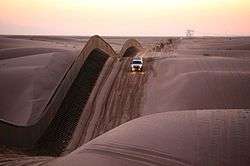


Examples of border walls include the ancient Great Wall of China, a series of walls separating China from nomadic empires to the north. The construction of border barriers increased in the early 2000s; half of all the border barriers built since World War II ended in 1945 were built after 2000.[3]
List of current barriers

Note: The table can be sorted alphabetically or chronologically using the ![]()
| Name | Country | Built | Length (km) | Type |
|---|---|---|---|---|
| Belize–Guatemala | Belize and Guatemala | Proposed, agreed | N/A | Disputed territory and anti-illegal immigration |
| Botswana–Zimbabwe | Botswana and Zimbabwe | 2003 | 500 | Anti-illegal immigration |
| Brunei–Malaysia | Brunei and the city of Limbang, Malaysia | 2005 | 20 | Anti-illegal immigration |
| Bulgaria–Turkey barrier | Bulgaria and Turkey | 2014 | 30 | Anti-illegal immigration |
| Ceuta border fence | Spain and Morocco | 2001 | 8 | Anti-illegal immigration |
| China–Hong Kong | Hong Kong and China | 1960s – early | 32 | Anti-illegal immigration |
| Costa Rica–Nicaragua | Costa Rica and Nicaragua | Proposed | N/A | Anti-illegal immigration |
| Green Line (Cyprus) | Cyprus and Northern Cyprus | 1964 | 180 | Buffer Zone |
| Chinese–Korean border fence | China and North Korea | Under construction | 1,416 | Anti-illegal immigration |
| Egypt–Gaza barrier | Egypt and Gaza Strip | 1979, subterranean barrier under construction | 3.1 | Anti-terrorism and anti-illegal immigration |
| Estonia–Russia barrier | Estonia and Russia | Planned | 106–108 | Against Russian intrusion, illegal trade and illegal immigration |
| Greece–Turkey border | Greece and Turkey | 2012 | 200 | Anti-illegal immigration |
| North Macedonia–Greece barrier | North Macedonia and Greece | 2015 | 30 | Anti-illegal immigration |
| Malaysia–Thailand border | Thailand and Malaysia | Proposed | 650 | Anti-terrorism |
| Melilla border fence | Spain and Morocco | 1998 | 11 | Anti-illegal immigration |
| Hungary–Serbia barrier | Hungary and Serbia | 2015 | 175 | Anti-illegal immigration |
| Hungary–Croatia barrier | Hungary and Croatia | 2015 | 41 | Anti-illegal immigration |
| India–Bangladesh barrier | India and Bangladesh | Under construction | 3,268 | Anti-illegal immigration |
| India–Myanmar barrier | India and Myanmar | Under construction | 1,624 | Anti-drug smuggling and anti-terrorism |
| India–Pakistan barrier | India Pakistan | 2004 | 550 | Anti-terrorism. |
| Iran–Pakistan barrier | Iran and Pakistan | Under construction | 700 | Anti-drug smuggling |
| Kazakhstan–Uzbekistan barrier | Kazakhstan and Uzbekistan | 2006 | 45 | Anti-drug smuggling |
| Korean Demilitarized Zone | North Korea and South Korea | 1953 | 248 | Conflict zone |
| Kruger National Park | South Africa and Mozambique | 1975 | 120 | Anti-illegal immigration |
| South Africa–Zimbabwe Border | South Africa and Zimbabwe | 2000s | 225 | Anti-illegal immigration, anti-drug smuggling, anti-weapon smuggling |
| Kuwait–Iraq barrier | Kuwait and Iraq | 1991 | 193 | Conflict zone |
| Libya–Tunisia barrier | Libya and Tunisia | TBA | 460 | Anti-Terrorism, Anti-illegal immigration |
| Norway–Russia border barrier | Norway and Russia | 2016 | 200 | Anti-illegal immigration |
| Pakistan–Afghanistan barrier | Pakistan and Afghanistan | Under construction | 2,400 | Anti-terrorism, anti-illegal immigration, anti drug smuggling |
| Saudi–Yemen barrier | Saudi Arabia and Yemen | 2004 | 75 | Anti-illegal immigration |
| Saudi–Iraq barrier | Saudi Arabia and Iraq | 2014 | 900 | Anti-illegal immigration and conflict zone |
| Slovenia–Croatia barrier | Slovenia and Croatia | under construction | 220 | Anti-illegal immigration |
| Turkey–Syria border barrier | Turkey and Syria | Under construction | 828 | Anti-terrorism, anti-illegal immigration and smuggling |
| Turkey–Iran border barrier | Turkey and Iran | Under construction | 144 | Anti-terrorism, anti-illegal immigration and smuggling |
| Turkmen–Uzbekistan barrier | Turkmenistan and Uzbekistan | 2001 | 1,700 | Anti-illegal immigration |
| Ukraine–Russia barrier | Ukraine and Russia | Under construction | 2,000 | Anti Weapon Smuggling and Conflict zone |
| United Arab Emirates–Oman barrier | United Arab Emirates and Oman | Under construction | 410 | Anti-illegal immigration |
| Mexico–United States barrier | United States and Mexico | Partially Constructed | 1,000 | Anti-illegal immigration and smuggling |
| Uzbek–Afghanistan barrier | Uzbekistan and Afghanistan | 2001 | 209 | Anti-illegal immigration |
| Uzbek–Kyrgyzstan barrier | Uzbekistan and Kyrgyzstan | 1999 | 870 | Conflict zone |
| Israel-West Bank barrier | Israel and West Bank | Partially Completed | 708 | Anti-terrorism (disputed territory) |
| Israel-Egypt barrier | Israel and Egypt | 2013 | 245 | Anti-illegal immigration |
| Israel-Lebanon barrier | Israel and Lebanon | 2018 | 11 | Conflict zone |
| Israel-Gaza barrier | Israel and Gaza Strip | 1994 | N/A | Anti-terrorism |
Barriers by region
Africa
Botswana
In 2003, Botswana began building a 480-kilometre-long (300 mi) electric fence along its border with Zimbabwe. The official reason for the fence is to stop the spread of foot-and-mouth disease among livestock. Zimbabweans argue that the height of the fence is clearly intended to keep out people. Botswana has responded that the fence is designed to keep out cattle, and to ensure that entrants have their shoes disinfected at legal border crossings. Botswana also argued that the government continues to encourage legal movement into the country. Zimbabwe was unconvinced, and the barrier remains a source of tension.[4]
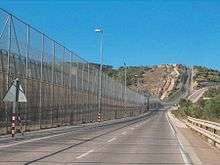
Ceuta
The Ceuta border fence was erected in 1993 at the Morocco–Spain border at Ceuta, a city on the North African coast that is Spanish territory in order to block the entrance of illegal immigrants to Spain.
Melilla
The Melilla border fence stands at the Morocco–Spain border at Melilla, a city on the North African coast that is Spanish territory, in order to block the entrance of illegal immigrants to Spain.
Morocco
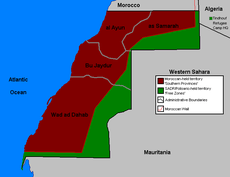
The Moroccan Wall is an approximately 2,700 kilometres (1,700 mi) long structure, mostly a sand wall (or "berm"), running through the region of Western Sahara and the southeastern portion of Morocco. It acts as a barrier between the Moroccan-controlled areas (Southern Provinces) and the Polisario-controlled section of the territory – Free Zone or de facto the self-proclaimed Sahrawi Arab Democratic Republic that lies along its eastern and southern border.
According to maps from MINURSO[5] or the UNHCR,[6] part of the wall extends several kilometers into internationally recognized Mauritanian territory.
South Africa

In 1975 a security fence of 120 kilometres (75 mi) was erected by South Africa to keep the violent revolution in Mozambique from spilling into Kruger National Park.[7] In 1990 it was reported:
Concern is growing in South Africa over the country's use of a lethal, 3,300 volt one amp electrified fence on its borders with Mozambique and Zimbabwe. According to a report recently published by the South African Catholic Bureau for Refugees, the fence has caused more deaths in three years than the Berlin Wall did in its entire history. Local people call the fence the 'Snake of Fire'. There have been calls by South African church leaders over the past months for the fence to be switched off permanently. Most of its victims have been women and children fleeing the war in Mozambique. The Berlin Wall resulted in 80 deaths over 28 years. Official figures provided by the South African Defence Force (SADF) indicate that 89 people were electrocuted at the fence between August 1986 and August 1989. Church leaders dispute these figures, and claim that the true figure is nearer 200 each year.[8]
On December 9, 2002, by the presidents of South Africa, Mozambique, and Zimbabwe signed a treaty authorizing the fence to be torn down in order to re-open the ancient elephant migration route between South Africa and Mozambique. The Great Limpopo Transfrontier Park of 35,000 square kilometres (14,000 sq mi) will connect the national parks of the three countries – South Africa's Kruger National Park, Mozambique's Limpopo National Park, and Zimbabwe's Gonarezhou National Park.[9]
In 2005 it was reported that only a relatively small portion of the high-security border fence separating South Africa's Kruger National Park with Zimbabwe's Gonarezhou Park had been removed. Security concerns, especially about illegal immigrants and the smuggling of weapons and four-wheel-drive vehicles, have been hindering the removal of more sections of the border fence.[10]
The Americas
Argentina
Argentina has constructed a border barrier wall along its 5 meters high, 1,300 km (807 mile) border with Paraguay.
United States

The United States has constructed a border barrier along 654 miles (1,053 km), some say more than 705 miles (1,135 km), (most of this section's data is from 2018), of its border with Mexico of 1,969 miles (3,169 km) to prevent illegal immigration and to deter smuggling of contraband, particularly illegal drugs. There has been discussion in the U.S. Congress on lengthening the barrier, but progress has been slow due to lobbying and lack of funding. In parts of the US (deserts and mountainous areas), there is only inferior fencing if anything. [11] President Donald Trump promised to build a 1,954-mile (3,145 km) border wall along the US–Mexico border during his campaign in the 2016 presidential election, famously pledging to "build the wall and make Mexico pay for it."[12][13] After his election, he authorized construction in January 2017 with Executive Order 13767.[14] In early 2018, 54% of Americans supported building a combination of physical and electronic barriers across the U.S.-Mexico border.[15][16] [17][18] In 2018, the federal government partly shut down for the longest period in U.S. history due to President Trump's refusal to consider a spending bill without funding for the proposed wall.[19] In February 2019, President Trump declared the National Emergency Concerning the Southern Border of the United States in order to use U.S. Department of Defense funding for the wall despite opposition from both houses of Congress.[20] In 2019, a majority of Americans (58%) now oppose substantially expanding the wall along the U.S.-Mexico border.[21][22]
Asia
Brunei
Brunei is building a security fence along its 20 kilometres (12 mi) border with Limbang, Malaysia, to stop the flow of irregular migrants and smuggled goods.
China (Hong Kong and Macau Special Administrative Regions)
The People's Republic of China (PRC) has two Special Administrative Regions on its southeastern coast – Hong Kong and Macau, both of which maintain controlled intra-national borders with the neighbouring Guangdong province in Mainland China. A Resident Identity Card is inspected when one crosses the border.
Hong Kong was a Dependent Territory of the UK until its sovereignty was handed over to the PRC in 1997, while Macau was a Special Territory of Portugal until its sovereignty was handed over to the PRC in 1999. Before the transfers of sovereignty back to the PRC, the Hong Kong–Guangdong and Macau–Guangdong borders were regarded as international borders.
Under the principle of "One Country, Two Systems", the two Special Administrative Regions continue to maintain their own customs and immigration policies, which are independent of those in Mainland China after the handovers. Due to differences in the policies between the special administrative regions and the Mainland, the Hong Kong–Guangdong and Macau–Guangdong borders have been maintained in operation after the returns.
Hong Kong has a border stretching 32 kilometres (20 mi) with the Shenzhen Special Economic Zone of Guangdong that features fences (topped with barbed tape/razor wire), thermal image sensors, lights, and closed-circuit television. Some sections are along the Shenzhen River thus acting as a physical barrier. The border is also patrolled regularly by police (and previously by the British Army until a short time before the handover in 1997). Just south of Shenzhen River (the geographical delimitation of the border) is a strip of rural land with restricted access, the 28 square kilometres (11 sq mi) Closed Area. Currently, the four road border crossings are located at Sha Tau Kok, Man Kam To, Lok Ma Chau, and Shenzhen Bay, and a railway and traveller crossing is located at Lo Wu. The residents of the Hong Kong Special Administrative Region are required to have their Hong Kong ID Cards inspected by the Hong Kong Immigration Department and their Home Return Permits inspected by the Public Security Bureau of Guangdong when they cross the border. Travelers from other countries and regions are required to present their passports or other types of travel documents for immigration clearance at both Hong Kong immigration checkpoints and Mainland China immigration ports.
Macau has been maintaining a 340 metres (1,120 ft) controlled border with Zhuhai City in Guangdong with a crossing available at the Border Gate (built in 1870).[23] The border crossing is equipped with 54 counters for travelers and 8 for vehicular traffic. Opened in 1999, Macau's Lotus Bridge supplemented what has been the only border crossing into mainland China through Border Gate. Both border crossings allow access to Zhuhai. Canal dos Patos, a former canal forms part of the border area along with Sun Yat-sen Municipal Park located to west of Border Gate area. Fencing along both sides of the canal restricts access to either side. Pagoda-like sentry towers are located along the Mainland China side of the border.
China (Mainland)
China, in October 2006, is also building a security barrier along its border with North Korea to prevent illegal immigrants.[24]
Egypt
Egypt began construction of a formidable barrier between Egypt and Gaza in 2009 prompted by concern that militant Islamist factions were making use of the Gaza Strip smuggling tunnels to move weapons and personnel between Gaza and Egypt.[25]
India
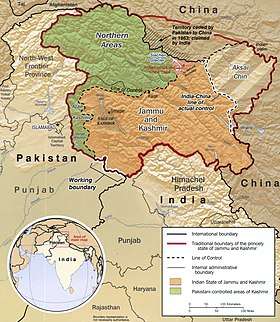
Since the mid-1990s, India has been involved in the construction of some of the lengthiest border barriers along its international borders. Six of the nine countries neighboring India are classified as Least Developed Countries, and thus thousands of people from these countries – especially from Bangladesh and Burma – illegally immigrate into India.
The India–Bangladesh barrier and India–Myanmar barrier are being built to check smuggling, illegal immigration, and infiltration by Islamist terrorists. The refugee crisis could also ensue should a climate catastrophe ravage South Asia.
In addition, India completed the construction of the India–Pakistan barrier, which runs along the Line of Control in Kashmir and India–Pakistan international border. The purpose of this barrier is to prevent infiltration by armed militants.
India has fortified parts of their border against Pakistan with a new detection system using lasers.[26]
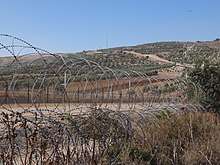
Iran
The Iran–Pakistan barrier wall is 700 kilometres (430 mi) long, which Iran claims is to stop the flow of illegal border crossings, stem the flow of drugs, and prevent terror attacks. However, the Provincial Assembly of Balochistan, whose lands straddle the border region, strongly opposed the barrier as the wall would divide the Baloch people politically and socially, with trade and social activities being seriously impeded.
Leader of the Opposition, Kachkol Ali, said the governments of the two countries had not taken the Baloch into their confidence on this matter[27] and demanded that construction be stopped immediately and he also appealed to the international community.[28] Residents of the Sorap locality in the Mand area of western Mekran region in Balochistan province rely on edible goods from Iran for their livelihood but Iranian border security forces vacate the town. According to BBC, "The Balochistanis, who live on both sides of the border and in the area where both countries neighbour Afghanistan, have had their communities divided by the wall."[29]
Israel
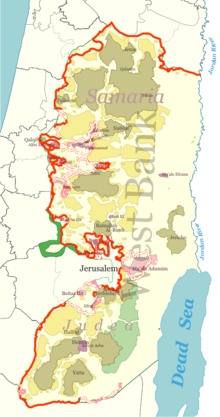
Due to Israel's specific security situation, as well as immigration concerns, border fences and walls have been utilized:
- Jerusalem: During the 1950s and 1960s a fortified barrier separated Jordanian and Israeli-controlled sectors of the city. More recently, the West Bank barrier separates some Arab parts of greater Jerusalem form the city proper.[30] During the tenure of Prime-Minister Arik Sharon, part of the Israeli-Jordanian Green Line was fenced-off by a barbed-wire protective barrier.
- Lebanon and Syria: Israel's borders with Lebanon and Syria have sophisticated security barriers.
- The barrier on the Golan Heights follows the border shaped by battles of the Yom Kippur War, but handed Kuneitra back to Syria.
- Egypt: Barrier proposed in 2005 and completed in 2013 to block smugglers, terrorists and illegal migrants.
- Jordan: This peaceful border is secured with a barrier designed to prevent the illegal movement of people in either direction.
- The Israel–Gaza barrier follows the 1949 Armistice lines.
- In the early 1990s, during the Oslo Accords, Yitzhak Rabin became the architect of delineated borders between Israel and the Palestinian Authority, and which came to fruition with the construction of barriers under Arik Sharon.
Korea
South Korea has constructed a border barrier between its territory and North Korea to obstruct any southward movement by the army of North Korea. The border features:
- Panmunjeom
- Military Demarcation Line
- Korean Demilitarized Zone
Kuwait
The United Nations has constructed a demilitarized zone to stop Iraq from re-invading Kuwait; Kuwait plans to install a new border barrier as well.
- Kuwait–Iraq barrier
Pakistan
In September 2005, Pakistan stated it has plans to build a 2,400-kilometre (1,500 mi) fence along its border with Afghanistan to prevent Islamic insurgents and drug smugglers slipping between the two countries. Former Pakistani President Pervez Musharraf has subsequently offered to mine the border as well.[31][32]
Russia
There is an electronic security barrier (ex-"Iron Curtain") along the old Soviet border. Also, a security barrier is on the border of Russia with Norway, Finland, China, Mongolia, and North Korea. There is no barrier on Russian territory along the border with Estonia, Latvia, Belarus, or Ukraine, but there are some barriers on the Estonian, Latvian sides. It was reported in 2005 that the Russian government was considering the construction of a security barrier along its internal border with Chechnya to combat terrorism.[33]
Saudi Arabia
Saudi Arabia has begun construction of a border barrier or fence between its territory and Yemen to prevent the unauthorized movement of people and goods. The difference between the countries' economic situations means that many Yemenis head to Saudi Arabia to find work. Saudi Arabia does not have a barrier with its other neighbors in the Gulf Cooperation Council, whose economies are more similar.
In 2006 Saudi Arabia proposed constructing a security fence along the entire length of its desert border of 900 kilometres (560 mi) with Iraq in a multimillion-dollar project to secure the Kingdom's borders in order to improve internal security, control illegal immigration, and bolster its defences against external threats.[34]
As of July 2009 it was reported that Saudis will pay $3.5 billion for security fence.[35] The combined wall and ditch will be 1,000 km (600 mi) long and include five layers of fencing, watch towers, night-vision cameras, and radar cameras and manned by 30,000 troops.[36]
The land borders between Saudi Arabia and Qatar were closed in 2017. Saudi Arabia has proposed the construction of the Salwa Canal along the Saudi-Qatar border, effectively turning Qatar into an island.[37]
Thailand
Thailand plans to build a concrete fence along parts of its border with Malaysia to keep Muslim militants and dual citizens from crossing Thailand's southern border with Malaysia.
Turkey
There are 4 border barriers around Turkey :
- Turkey–Syria border barrier
- Turkey–Iran border barrier
- Bulgaria–Turkey border
- Turkey–Greece border barrier
The barrier on the Syrian border is the third longest wall in the world after the Great Wall of China and the U.S.-Mexico border wall.[38]
United Arab Emirates
The UAE is building a security barrier along its border with Oman.
- United Arab Emirates–Oman barrier
Uzbekistan
In 1999 Uzbekistan began constructing a barbed wire fence to secure its border with Kyrgyzstan.
In 2001 Uzbekistan fortified the fence with Afghanistan.
Europe
Austria
In October 2015, during the European migrant crisis, the Austrian interior minister Johanna Mikl-Leitner announced construction of up to 15 kilometres (9.3 mi) long border barriers at several border crossings with Slovenia. The barrier is to be guarded by Austrian police and Austrian Armed Forces.[39]
Belarus

There is an electronic security barrier along the Belarus–Poland border consisting of Soviet-made security electric fences S-175 and KS-185. There are no electronic barriers on other borders.
Denmark
During 2019, Denmark built a 1,5 m (5 ft) high fence along its border to Germany. Officially it is to keep out wild boars which are alleged to carry African swine fever.[41] Denmark also enforces border controls on the border with Germany.
France
The Calais border barrier built jointly by Britain and France on French soil surrounds the port and Channel Tunnel entrance at Calais.[43] Many migrants have tried to enter Britain by jumping on trucks or trains using the tunnel.
Germany
.jpg)
From 1952 onwards, East Germany started to construct a fortified Inner German border to separate it from West Germany. From 1961 the Berlin Wall also divided the city of Berlin into two. Most of the wall was demolished in and after 1989.
Greece
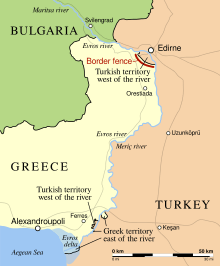
After having made an agreement with Frontex on the guard of the maritime borders of Greece with Turkey[44] the Greek government decided a wall to be built at the land border with Turkey, the Evros River.[45] These actions have been made as a reaction to the illegal immigration to Greece through the Greco-Turkish borders. These immigrants are originated from Asian and African states. From January to the beginning of November 2010, 32,500 illegal migrants were intercepted in a single 12.5 kilometres (7.8 mi) stretch of the Turkish–Greek border along the Evros River.[46] This site is the main entrance of illegal immigrants to the EU from the Asian continent.[46] Illegal immigration is a current sore subject between the two countries.
Greece has constructed a barrier on the section of its land border with Turkey that is not separated by the Evros river, between October 2011 and December 2012.[47]
Hungary
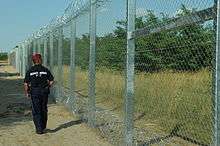
Hungary completed the construction of a 175 kilometres (109 mi) wall between Hungary and Serbia in September 2015 and on the border with Croatia in October 2015 to stop illegal migration into the EU.[48] In April 2016, Hungarian government announced construction of reinforcements of the barrier, which it described as "temporary".[49] In July 2016, nearly 1,300 migrants were "stuck" on the Serbian side of the border.[50] In August 2016, Orbán announced that Hungary will build another larger barrier on its southern border.[51] On April 28, 2017, the Hungarian government announced it had completed a second fence, 155 kilometres (96 mi) long, on the Serbian border.[52][53]
On September 24, 2015, Hungary began building fence on its border with Slovenia, in the area around Tornyiszentmiklós–Pince border crossing.[54] The razor wire obstacle was removed two days later.[55] As of March 2016, everything is in place if Hungary decides to build a border barrier on the Hungarian–Romanian border – the military is "only waiting for the command from the government".[56]
Attempted border entries have fallen since the barrier was constructed. During the month of September 2015 there was a total number of 138,396 migrant entries, and by the first two weeks of November the average daily number of intercepted migrants decreased to only 15, which is a daily reduction of more than 4,500.[57]
Lithuania
BBC News reported in January 2017, that Lithuania was planning a fence on its border with the Russian exclave of Kaliningrad.[59] The fence is to be 2 metres (6 ft 7 in) tall and 130 kilometres (81 mi) long.[60]
Macedonia
Macedonia began erecting a fence on its border with Greece in November 2015.[61]
Norway
In 2016 Norway constructed a barrier along a short part of its border with Russia, near the only official border crossing.[62]
Slovenia
Slovenia began erecting a border barrier along its border with Croatia in 2015 to control illegal migration into the Schengen Area.[63] As of November 2019 there was 220 kilometres (137 mi) of fences in total. They built extra kilometres in early 2020.[64][65]
Spain
The European Union and Spain have constructed barriers between Morocco and the Spanish exclaves of Ceuta and Melilla to prevent illegal immigration and smuggling.
Even though both the United Kingdom and Spain are part of the European Union, the border fence separating Gibraltar and Spain is still relevant because Gibraltar, a British Overseas Territory, is not part of the Schengen Area so remains outside of the customs union and VAT area. The border crossing is open twenty-four hours a day to facilitate customs collection by Spain.
Ukraine
United Kingdom
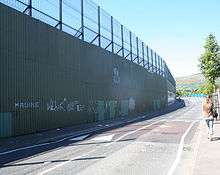
In Belfast, Derry, and other settlements in Northern Ireland, barriers called "peace lines" have been built to separate the two main communities. Their purpose is to minimize inter-communal violence between Irish nationalists/republicans (who mainly self-identify as Irish and/or Catholic) and unionists/loyalists (who mainly self-identify as British and/or Protestant). They were first built following the 1969 riots and beginning of the "Troubles". They have continued to be built and expanded since the Belfast Agreement of 1998. In 2008 a public discussion began about how and when the barriers could be removed.[66] On 1 September 2011, Belfast City Council agreed to develop a strategy regarding the removal of peace walls.[67] At the end of 2011 several local community initiatives resulted in several interface structures being opened for a trial period.[68] In January 2012, the International Fund for Ireland launched a Peace Walls funding programme to support local communities who want to work towards removing the peace walls.[69]
Border barriers in history
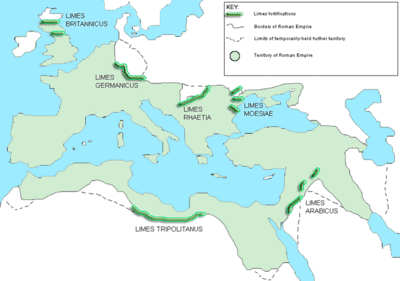
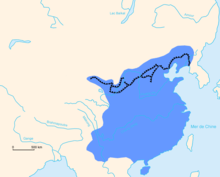
Antiquity
- Antonine Wall (began in AD 142 by the Roman province in Britain)
- Great Wall of China (parts were built as early as the 7th century BC by the Qi Dynasty in China)
- Great Wall of Gorgan (built in 5th or 6th century AD)
- Hadrian's Wall (begun in AD 122)
- Madukkarai Wall (may have been built as early as the 1st century AD in India)
- Southern Great Wall, southern counterpart wall to the Great Wall, erected to protect and divide the Chinese from the "southern barbarians" called Miao (meaning barbaric and nomadic)[70]
Middle Ages
Early modern period
- Zanja de Alsina, built in the 1870s along the southern frontier of Argentina
- Great Hedge of India, built by the British in 1803
Defunct barriers in modern times
- The Czechoslovak border fortifications and fortified defensive lines built between 1935 and 1938 as a defensive countermeasure against the rising threat of Nazi Germany.
- The Maginot Line, built between 1929 and 1938 by France on the French–German border as a defensive structure.
- Between Russia (Soviet Union) and Finland/Norway there was a fence on the Soviet side along the entire border (more than 1,000 kilometres (620 mi)) during the Cold War. Along the Finnish border it was not so well guarded since Finland agreed to send back all Russians who escaped. The fence was located a few kilometers (miles) from the border, and still partly remains, even though the border controls are open now. Russian law still forbids crossing the border outside of a border station.
- Iron Curtain, including:
- Berlin Wall
- Inner German border
- German–Czech Border
- Panama Canal fence
Other
- Danevirke
- Gates of Alexander
- Götavirke
- Limes Germanicus
- Limes Saxoniae
- Offa's Dyke
- Willow Palisade
- Zasechnaya cherta
See also
- Buffer zone
- Canada–United States border
- Defense line
- Demilitarised zone
- Defensive walls
- List of cities with defensive walls
- List of fortifications
- List of walls
- Marches
References
- "Return of the Fence: Immigration crisis spurs renewed calls for border barrier". Fox News. 2014-07-09. Retrieved 2016-05-21.
- "Border Barrier". Frontline. Retrieved 2016-05-21.
- Friedman, Uri (19 May 2016). "A World of Walls". The Atlantic. Retrieved 20 May 2016.
- Phillips, Barnaby (2004-03-30). "Zimbabwe crisis spills over border". BBC News. Retrieved January 4, 2010.
- "Archived copy" (PDF). Archived from the original (PDF) on October 27, 2007. Retrieved October 27, 2007.CS1 maint: archived copy as title (link)
- United Nations High Commissioner for Refugees. "UNHCR – Western Sahara Atlas Map – June 2006". Unhcr.org. Retrieved 2016-05-21.
- "RSA – Mozambique Border Fence". Home.telkomsa.net. Retrieved 2013-09-22.
- Monteiro, Tania (1990-01-27). "'Hundreds killed' by South Africa's border fence". New Scientist. Retrieved 2016-05-21.
- "Archived copy". Archived from the original on May 23, 2012. Retrieved September 22, 2013.CS1 maint: archived copy as title (link)
- "Archived copy". Archived from the original on January 24, 2009. Retrieved September 22, 2013.CS1 maint: archived copy as title (link)
- http://www.gao.gov/new.items/d06770.pdf
- https://www.donaldjtrump.com/policies/immigration
- "Trump-O-Meter: | PolitiFact". www.politifact.com. Retrieved 2020-02-24.
- Davis, Julie Hirschfeld (2017-01-25). "Trump Orders Mexican Border Wall to Be Built and Plans to Block Syrian Refugees". The New York Times. ISSN 0362-4331. Retrieved 2020-02-24.
- Kerns, Jen (2018-02-03). "New polling proves President Trump is right — 'Americans are #Dreamers, too'". The Hill. News Communication.
61 percent think that current border security is inadequate, and ... 54 percent support a physical barrier
- De Pinto, Jennifer; Backus, Fred; Khanna, Kabir; Salvanto, Anthony (20 January 2018). "Most Americans support DACA, but oppose border wall – CBS News poll". CBS.
Most Americans ... oppose building a border wall, but seven in 10 Republicans support it.
- Salvanto, Anthony; De Pinto, Jennifer (21 December 2018). "Most Americans don't support building the wall". CBS.
59 percent of Americans oppose building a wall... A large majority of Republicans support the wall -- 79 percent. A majority of independents -- 66 percent -- oppose the wall, and 84 percent of Democrats are also against it.
- Kurtzleben, Danielle (23 January 2018). "What The Latest Immigration Polls Do (And Don't) Say". NPR.
Given the choice between "open borders" ... and a "secure border," 79 percent of Americans agreed that the U.S. needs "secure borders." ... In a different poll, 58 percent of Americans support "building a combination of physical and electronic barriers across the U.S.-Mexico border."
- "Government Shutdown 2019". POLITICO. Retrieved 2020-02-24.
- Baker, Peter (2019-02-15). "Trump Declares a National Emergency, and Provokes a Constitutional Clash". The New York Times. ISSN 0362-4331. Retrieved 2020-02-24.
- Gramlich, John. "How Americans see illegal immigration, the border wall and political compromise". Pew Research Center. Pew Research Center. Retrieved 1 August 2019.
- Norman, Jim (4 February 2019). "Solid Majority Still Opposes New Construction on Border Wall". Gallup News. Gallup. Retrieved 1 August 2019.
- "LateRooms – Last Minute Hotel Deals & Cheap Hotels". AsiaRooms.com. Retrieved 2016-05-21.
- "Archived copy". Archived from the original on August 20, 2012. Retrieved October 23, 2012.CS1 maint: archived copy as title (link)
- Fraser, Christian (9 December 2009). "Egypt starts building steel wall on Gaza Strip border". BBC. Retrieved 17 February 2017.
- "BSF activates 'laser walls' along India-Pakistan border".
- "Debate on Iran border wall disallowed". dawn.com. May 27, 2007. Archived from the original on September 27, 2007. Retrieved 2013-09-22.
- "BAE Systems to deliver 145 M777 Ultra Light Howitzers to the Indian Army". Archived from the original on November 18, 2012. Retrieved September 22, 2013.
- "South Asia | World's barriers: Pakistan–Iran". BBC News. 2009-11-05. Retrieved 2013-09-22.
- "Behind the Wall – Shuafat Refugee Camp". Ir Amim. Archived from the original on May 23, 2012.
-
"Pakistan doing all it can in terror war – Musharraf". Turkish weekly. February 28, 2006. Archived from the original on October 9, 2006. Retrieved 2006-12-03.
WASHINGTON (Reuters) – Pakistani President Pervez Musharraf said on Monday his country was doing all it could in the U.S.-led war against terrorism and offered to fence and mine its border with Afghanistan to stem Taliban infiltration. "I have been telling Karzai and the United States, 'Let us fence the border and let us mine it.' Today I say it again. Let us mine their entire border. Let us fence it. It's not difficult", Musharraf said, referring to Afghan President Hamid Karzai.
- Plett, Barbara (March 1, 2006). "Musharraf interview: Full transcript". BBC News. Retrieved 2006-12-03.
Now the other thing that I've said: if he thinks everyone is crossing from here, I've been saying let us fence the border and let us also mine the border. We are experts at mining, they should mine the border on their side. We will fence it on our side. If that is all right I am for it, so that they are not allowed to go across at all. And then let us see what is happening in Afghanistan. Why don't they agree to this, I've said this openly many times before, they don't do it, for whatever are their reasons. I know how effective the fence, the Indian fence which is about 1,800 kilometres, and they are fencing the Kashmir mountains also, it is so difficult. Why are they doing that, are they mad, they are spending billions of rupees. Because it is effective. Let's fence this border so that this blame game is killed once for ever.
- Katz, Yaacov (November 8, 2005). "Israel may export fence to Russia". jpost.com. Retrieved 2007-03-05.
The Russian government is mulling the construction of a security barrier along the border with Chechnya similar to Israel's West Bank security fence as part of its efforts to combat Muslim terror
- Theodoulou, Michael (6 April 2006). "Saudis plan to fence off border with chaos". Timesonline.co.uk. Archived from the original on 29 September 2006.
- Spencer, Richard (2015-01-14). "Revealed: Saudi Arabia's 'Great Wall' to keep out Isil". Telegraph. Retrieved 2016-05-21.
- France-Presse, Agence (September 2018). "Saudi Arabia may dig canal to turn Qatar into an island". The Guardian.
- "Turkey-Syria border wall to be completed by spring - Turkey News".
- "Mikl-Leitner baut "Grenz-Zaun"". Oe24.at. 2015-01-12. Retrieved 2016-05-21.
- Caroline Mortimer. Bulgaria builds final part of razor wire fence to keep out refugees. The Independent. 4 August 2015.
- Bolongari, Kait (28 January 2019). "Denmark building wild boar fence along border with Germany". Politico.
- Estonia 'plans Russia border fence' amid Ukraine tensions. BBC News. 28 August 2015
- McAuley, James (29 September 2016). "France and Britain just beat Donald Trump to building a border wall". Washington Post. Retrieved 29 September 2016.
- "Frontex signs seat agreement with Greece". Archived from the original on March 16, 2012. Retrieved September 22, 2013.
- Συντάχθηκε απο τον/την theInsider (2010-03-14). "Τείχος κατά μεταναστών στον Έβρο!". Theinsider.gr. Retrieved 2013-09-22.
- "TURKEY – Greece to put up anti-migrant wall on Turkish border". Hurriyetdailynews.com. 2011-01-02. Retrieved 2013-09-22.
- Danae Leivada. Why Greece Shut The Shortest, Safest Route For Migrants And Refugees. The Huffington Post. Published on 09/24/2015.
- "Hungary to fence off border with Serbia to stop migrants". Reuters. 2015-06-17. Retrieved June 18, 2015.
- "Reinforcement of temporary border barrier starts on the Hungarian–Serbian border". Retrieved 26 January 2017.
- Migrant crisis: UN criticises Hungary over border controls. BBC News. Published on 9 July 2016.
- Hungary's PM plans 'more massive' fence to keep out migrants. theguardian.com. 26 August 2016.
- "Hungary Completes 2nd Border Fence Meant to Stop Migrants". Fox News (from the Associated Press). April 28, 2017. Retrieved September 13, 2017.
- "Hungary Completes Second Fence to Keep Out Migrants". Deutsche Welle. April 28, 2017. Retrieved September 13, 2017.
- A szlovén határnál is készül drótakadály Archived 2017-09-01 at the Wayback Machine Híradó, September 24, 2015 (in Hungarian)
- Tekercsekben áll a lebontott drótakadály a magyar-szlovén határon Blikk, September 26, 2015 (in Hungarian)
- It is possible every time that Hungary starts to build the fence on the Romanian border. nol.hu, 05 March, 2016.
- "Elfogott migránsok száma – dátum szerinti lekérdezés". A Magyar Rendőrség hivatalos honlapja (in Hungarian). Archived from the original on 2017-09-03. Retrieved 2017-09-13.
- Jeremy Bender. A nation bordering Russia is building a fence along a third of its border. Business Insider. Published on December 16, 2015.
- Lithuania plans fence on Russian Kaliningrad border. BBC News. January 27, 2017.
- Lithuania builds Russian border fence as Nato boosts Baltic defences. The Irish Times. January 18, 2017.
- Yannis Behrakis. Police, migrants clash on Macedonia border; soldiers build fence. Reuters. November 28, 2015.
- Osborne, Samuel (25 August 2016). "Norway to build border fence with Russia to keep out refugees". The Independent.
- Surk, Barbara (11 November 2015). "Slovenia Starts Building Border Fence to Stem Flow of Migrants". New York Times. Retrieved 11 November 2015.
- "New 40 kilometres of fences will be build in Slovenia in 2019" (in Slovenian). 24ur.com. Retrieved 28 July 2019.
- "One third of south border in fences" (in Slovenian). 24ur. Retrieved 3 March 2020.
- Tony Macaulay (July 2008). "A Process for Removing Interface Barriers: A discussion paper proposing a five phase process for the removal of 'peace walls' in Northern Ireland" (PDF). Macaulay Associates. Retrieved 2010-02-06.
- "Belfast's peace walls may be set to tumble". Irishtimes.com. 2011-09-03. Retrieved 2016-05-21.
- "£2m to tear down Northern Ireland peace walls". BelfastTelegraph.co.uk. 2012-01-18. Retrieved 2013-09-22.
- "Northern Ireland: Cash Boost For Plan To Bring Down Peace Walls". Huffingtonpost.co.uk. 2012-01-18. Retrieved 2013-09-22.
- Learned, J.G. "The Hmong: Part 1 Legend and History". North-by-North-East.com. Archived from the original on December 8, 2010. Retrieved September 22, 2013.
External links and further reading
| Wikimedia Commons has media related to Boundary walls. |
- "Around Globe, Walls Spring Up to Divide Neighbors". Reuters. April 30, 2007.
- "Border to Border, Wall to Wall, Fence to Fence". Subtopia.
- "CityWalls". Erasmuspc. Archived from the original on 2012-02-06.
- "Obama's Border Fence". NOW. PBS. July 3, 2009.
- "Security Fences". The Atlantic Monthly.
.jpg)